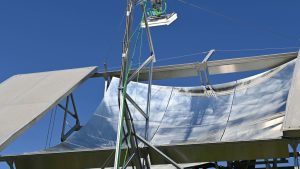A special issue of Energies (ISSN 1996-1073). This special issue belongs to the section «A2: Solar Energy and Photovoltaic Systems«.
Deadline for manuscript submissions: 20 October 2023
Special Issue Editors
Interests: concentrated solar thermal (CST) power; energy conversion; renewable energy systems; power cycles; turbomachinery; heat and mass transfer; thermodynamics

Interests: concentrated solar thermal (CST) power; solar energy; energy policy; optimization; heat transfer and thermodynamics; optics
Special Issues, Collections and Topics in MDPI journals
Interests: concentrated solar thermal (CST) power; CST modelling tools/software development; solar energy; integrated optics; metamaterials; light scattering
Special Issue Information
Dear Colleagues,
The Energies journal invites submissions to this Special Issue on solar energy: “Latest Trends in Concentrated Solar Thermal (CST) Systems”. This Special Issue is dedicated to advancements in the field of CST systems and welcomes original work and review papers that contribute to the current state of the art in the field. Specific areas of interest include, but are not limited to, the following:
- Methods, systems and methodologies for future higher-efficiency CST plants;
- New or advanced CST concepts (e.g., multitower systems, hybridization with photovoltaics (PV) and concentrating PVs, beam downs, etc.);
- Novel/innovative CST components/devices and/or sub-systems for CST light collection and concentration systems (e.g., receivers, heliostats, absorber tubes, lenses, tracking systems, Stirling engines, etc.);
- Key enabling technologies for increasing automation and the automatization of tasks and processes during both the design and optimization phase and during the actual operation of CST systems (e.g., machine vision, artificial intelligence, semantic technologies, edge computing for data management, novel plant control approaches, etc.);
- Integration of unmanned aerial vehicles (UAVs/drones) and unmanned ground vehicles (UGVs) for operational and maintenance tasks;
- Advances in thermal energy storage and integration with CST;
- Advances in concentrating solar furnace and solar chemistry applications;
- Sun-tracking algorithms;
- Studies regarding the start-up, shutdown and load variation in current and future CST plants, including the integration of novel and promising high-efficiency thermodynamic cycles (e.g., supercritical carbon dioxide, sCO2) and efficient integration into modern grid architectures;
- Studies regarding industrial applications of CST (e.g., for providing industrial heat, power and other commodities, etc.);
- Studies regarding the role of CST in long-term energy and climate planning;
- Studies regarding the environmental impacts of CST (e.g., water, land, flora and fauna), including methods for improving the environmental profile of future plants, life cycle assessments (LCAs), and circularity by design;
- Advances and new approaches in software tools to assist in the design, simulation and optimization of CST (e.g., Monte Carlo ray-tracing, cone optics, heliostat layout optimization codes/algorithms, overall plant optimization tools, etc.).
The Special Issue also welcomes contributions on diverse applications of concentrated solar thermal applications, including but not limited to:
- CST-driven thermal desalination and brine management;
- CST-driven green hydrogen production and storage;
- CST applications in the built environment;
- CST cracking (e.g., methane cracking, natural gas cracking, etc.);
- CST cooking;
- Short-term forecasting and nowcasting methods applicable for enhancing the operation of CST and enabling optimized operation of grid-connected CST plants;
- CST for space applications (e.g., for propulsion, orbital control, electricity generation, space solar heating harvesting, etc.)
Dr. Kypros Milidonis
Prof. Dr. Manuel J. Blanco
Dr. Victor Grigoriev
Guest Editors
Manuscript Submission Information
Manuscripts should be submitted online at www.mdpi.com by registering and logging in to this website. Once you are registered, click here to go to the submission form. Manuscripts can be submitted until the deadline. All submissions that pass pre-check are peer-reviewed. Accepted papers will be published continuously in the journal (as soon as accepted) and will be listed together on the special issue website. Research articles, review articles as well as short communications are invited. For planned papers, a title and short abstract (about 100 words) can be sent to the Editorial Office for announcement on this website.
Submitted manuscripts should not have been published previously, nor be under consideration for publication elsewhere (except conference proceedings papers). All manuscripts are thoroughly refereed through a single-blind peer-review process. A guide for authors and other relevant information for submission of manuscripts is available on the Instructions for Authors page. Energies is an international peer-reviewed open access semimonthly journal published by MDPI.
Please visit the Instructions for Authors page before submitting a manuscript. The Article Processing Charge (APC) for publication in this open access journal is 2200 CHF (Swiss Francs). Submitted papers should be well formatted and use good English. Authors may use MDPI’s English editing service prior to publication or during author revisions.


